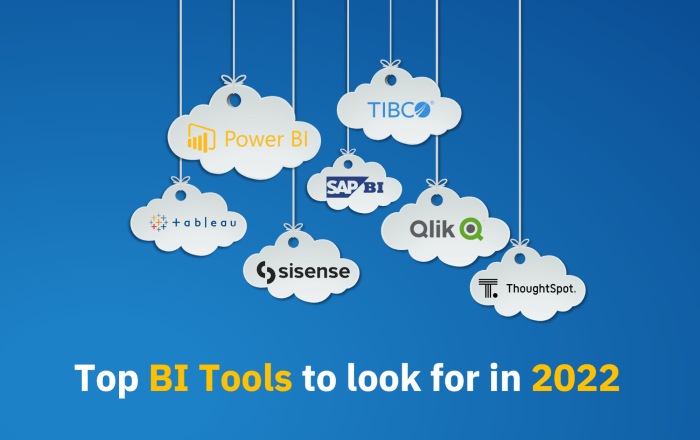Top BI tools for small businesses are essential for empowering decision-making and streamlining operations, enabling small enterprises to thrive in a competitive marketplace. These tools not only help in analyzing data effectively but also enhance efficiency by providing valuable insights that drive strategic planning.
From retail to healthcare, small businesses across various industries benefit significantly from implementing BI tools. By harnessing data analytics, these businesses can uncover trends, optimize processes, and ultimately increase profitability, making the right selection of BI tools imperative for their success.
Overview of BI Tools for Small Businesses: Top BI Tools For Small Businesses

Business Intelligence (BI) tools are crucial for small enterprises seeking to enhance their decision-making processes. These tools enable businesses to analyze data, uncover insights, and make informed decisions that can lead to growth and success. In an increasingly competitive marketplace, the ability to harness data effectively is not just an advantage but a necessity for small businesses.
BI tools streamline operations and improve efficiency by automating data collection, analysis, and reporting. This automation reduces the time employees spend on manual tasks, allowing them to focus on strategic initiatives that drive value. For instance, retailers can use BI tools to track sales trends and optimize inventory management, while service providers can analyze customer feedback to enhance service delivery.
Industries such as retail, hospitality, healthcare, and marketing are examples where small businesses significantly benefit from the implementation of BI tools. In retail, for instance, small shops can analyze customer purchasing behavior to tailor marketing campaigns effectively.
Key Features to Look for in BI Tools
When selecting BI tools, small businesses should prioritize specific features that enhance usability and functionality. These features include:
- User-Friendliness: An intuitive interface is crucial for small businesses that may not have dedicated IT staff. The easier the tool is to use, the quicker teams can adapt and start leveraging its capabilities.
- Integration Capabilities: BI tools should seamlessly integrate with existing software systems, such as CRM and accounting software, to provide a unified view of business performance.
- Data Visualization: Effective data visualization tools are essential for turning complex data sets into understandable graphics. This helps in quick analysis and enhances communication of insights across teams.
- Reporting Functionalities: Comprehensive reporting features allow businesses to generate customized reports that support various decision-making scenarios.
Top BI Tools Recommended for Small Businesses, Top BI tools for small businesses
A comparison of leading BI tools available for small businesses reveals their unique strengths and weaknesses. Below is a table summarizing key features:
| BI Tool | Key Features | Strengths | Weaknesses |
|---|---|---|---|
| Tableau | Data Visualization, Integration | User-friendly, Strong analytics capabilities | Costly for advanced features |
| Power BI | Real-time Data, Collaboration | Affordable, Easy integration with Microsoft products | Limited customization options |
| Looker | Data Modeling, Exploration | Powerful data exploration tools | Complex setup for beginners |
| Zoho Analytics | AI Insights, Custom Reports | Cost-effective, Good for small teams | Limited scalability |
Pricing options and subscription models vary widely among these tools. While some may offer free tiers, others could have monthly subscriptions ranging from $20 to over $100 per user, depending on the features selected.
Implementation Strategies for BI Tools

Effectively implementing BI tools in a small business environment involves several crucial steps:
- Assessment of Needs: Before implementation, it’s essential to assess the specific data and reporting needs of the business to choose the right tool.
- Data Migration: Prepare for the transfer of existing data to the new BI system, ensuring that all relevant data is accurately moved.
- Training Staff: Training is vital to ensure that employees understand how to use the new tools effectively. Workshops and tutorials can enhance proficiency.
- Data Quality Assurance: Establish protocols to maintain data quality and security, which is critical during and after implementation.
Case Studies of Small Businesses Using BI Tools
Several small businesses have successfully implemented BI tools, showcasing their effectiveness:
- ABC Retail: After adopting Tableau, ABC Retail improved its inventory management by 30% within six months, leading to a significant increase in revenue.
- XYZ Services: By using Power BI, XYZ Services streamlined its reporting process, reducing the time spent on report generation from hours to minutes.
- 123 Hospitality: With the implementation of Zoho Analytics, 123 Hospitality was able to analyze customer feedback more effectively, resulting in a 15% improvement in customer satisfaction ratings.
Despite the successes, challenges during the adoption of BI tools included resistance to change among staff and initial difficulties in data integration. However, these challenges were overcome through clear communication of the benefits and structured training programs.
Future Trends in BI Tools for Small Businesses
Emerging trends in BI technology indicate that small businesses will increasingly leverage advanced capabilities to stay competitive. Key trends include:
- AI and Machine Learning: The integration of AI into BI tools will enable predictive analytics, helping small businesses anticipate market trends and consumer behavior.
- Cloud-Based Solutions: Cloud technology will continue to dominate, offering scalability and flexibility for small businesses as they grow.
- Self-Service BI: Tools that empower end-users to create their own reports and dashboards will enhance accessibility and reduce dependence on IT.
As the market evolves, small businesses can expect BI tools to become more user-friendly and tailored to meet their unique needs, ensuring they can adapt quickly to future demands.
Wrap-Up

In summary, the integration of top BI tools for small businesses unlocks a world of opportunities for improved operational efficiency and informed decision-making. As these tools evolve, small enterprises that adopt them will not only stay competitive but also pave the way for future growth and innovation.
